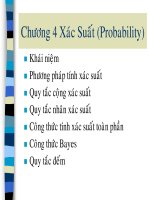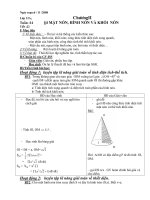Tài liệu Câu điều kiện: Câu điều kiện loại 2 pptx
Bạn đang xem bản rút gọn của tài liệu. Xem và tải ngay bản đầy đủ của tài liệu tại đây (69.02 KB, 3 trang )
Câu điều kiện: Câu điều kiện loại 2
Second Conditional: unreal possibility or dream
Câu điều kiện loại 2 : Điều kiện không có thực
The second conditional is like the first conditional. We are still thinking about the future. We
are thinking about a particular condition in the future, and the result of this condition. But there
is not a real possibility that this condition will happen. For example, you do not have a lottery
ticket. Is it possible to win? No! No lottery ticket, no win! But maybe you will buy a lottery ticket
in the future. So you can think about winning in the future, like a dream. It's not very real, but
it's still possible.
(Câu điều kiện loại 2 giống như câu điều kiện loại 1 là chúng ta vẫn đang nghĩ về tương lai, về
kết quả của hành động trong tương lai. Nhưng sẽ không có tình huống có thật nào xảy ra. Ví dụ:
Bạn không có vé số, vậy thì làm sao có thể trúng? Không! Không có vé thì không bao giờ trúng.
Nhưng nếu bạn mua một tấm vé trong tương lai, thì bạn hoàn toàn có thể nghĩ đến việc trúng
trong tương lai, nó như một giấc mơ vậy. Điều đó không hẳn sẽ có thật nhưng vẫn có thể xảy
ra.)
IF condition result
past simple WOULD + base verb
If I won the lottery I would buy a car.
Notice that we are thinking about a future condition. We use the past simple tense to talk about
the future condition. We use WOULD + base verb to talk about the future result. The important
thing about the second conditional is that there is an unreal possibility that the condition
will happen.
(Nhận thấy rằng chúng ta đang nghĩ về điều kiện trong tương lai. Chúng ta dùng thời Quá khứ
đơn để nói về điều kiện trong tương lai. Chúng ta dùng: WOULD + động từ nguyên thể không
TO để nói về kết quả trong tương lai. Điều quan trọng về câu điều kiện loại 2 là khả năng không
có thật sẽ xảy ra.)
Here are some more examples:
Sau đây là một vài ví dụ
:
IF condition result
past simple WOULD + base verb
If I married Mary I would be happy.
If Ram became rich she would marry him.
If it snowed next July would you be surprised?
If it snowed next July what would you do?
result IF condition
WOULD + base verb past simple
I would be happy if I married Mary.
She would marry Ram if he became rich.
Would you be surprised if it snowed next July?
What would you do if it snowed next July?
Second Conditional: unreal possibility or dream
Câu điều kiện loại 2 : Điều kiện không có thực
The second conditional is like the first conditional. We are still thinking about the future. We
are thinking about a particular condition in the future, and the result of this condition. But there
is not a real possibility that this condition will happen. For example, you do not have a lottery
ticket. Is it possible to win? No! No lottery ticket, no win! But maybe you will buy a lottery ticket
in the future. So you can think about winning in the future, like a dream. It's not very real, but
it's still possible.
(Câu điều kiện loại 2 giống như câu điều kiện loại 1 là chúng ta vẫn đang nghĩ về tương lai, về
kết quả của hành động trong tương lai. Nhưng sẽ không có tình huống có thật nào xảy ra. Ví dụ:
Bạn không có vé số, vậy thì làm sao có thể trúng? Không! Không có vé thì không bao giờ trúng.
Nhưng nếu bạn mua một tấm vé trong tương lai, thì bạn hoàn toàn có thể nghĩ đến việc trúng
trong tương lai, nó như một giấc mơ vậy. Điều đó không hẳn sẽ có thật nhưng vẫn có thể xảy
ra.)
IF condition result
past simple WOULD + base verb
If I won the lottery I would buy a car.
Notice that we are thinking about a future condition. We use the past simple tense to talk about
the future condition. We use WOULD + base verb to talk about the future result. The important
thing about the second conditional is that there is an unreal possibility that the condition
will happen.
(Nhận thấy rằng chúng ta đang nghĩ về điều kiện trong tương lai. Chúng ta dùng thời Quá khứ
đơn để nói về điều kiện trong tương lai. Chúng ta dùng: WOULD + động từ nguyên thể không
TO để nói về kết quả trong tương lai. Điều quan trọng về câu điều kiện loại 2 là khả năng không
có thật sẽ xảy ra.)
Here are some more examples:
Sau đây là một vài ví dụ
:
IF condition result
past simple WOULD + base verb
If I married Mary I would be happy.
If Ram became rich she would marry him.
If it snowed next July would you be surprised?
If it snowed next July what would you do?
result IF condition
WOULD + base verb past simple
I would be happy if I married Mary.
She would marry Ram if he became rich.
Would you be surprised if it snowed next July?
What would you do if it snowed next July?









